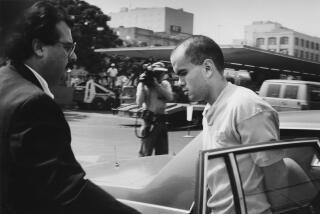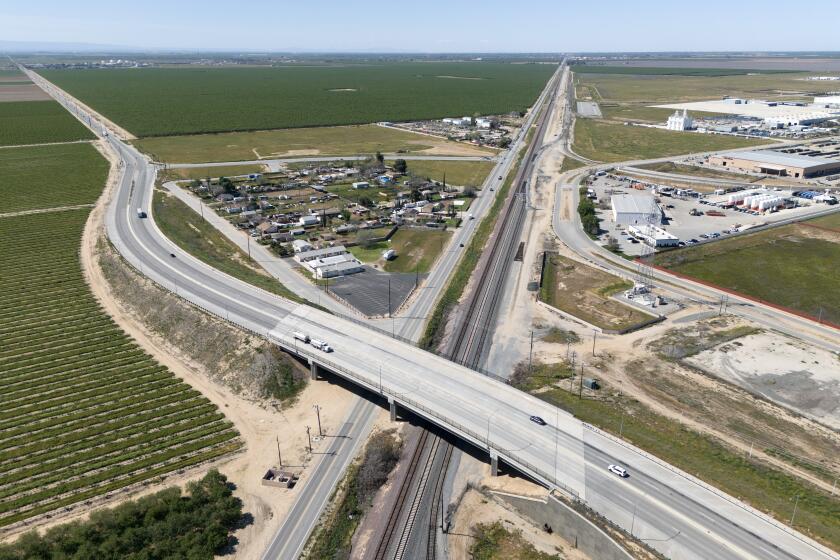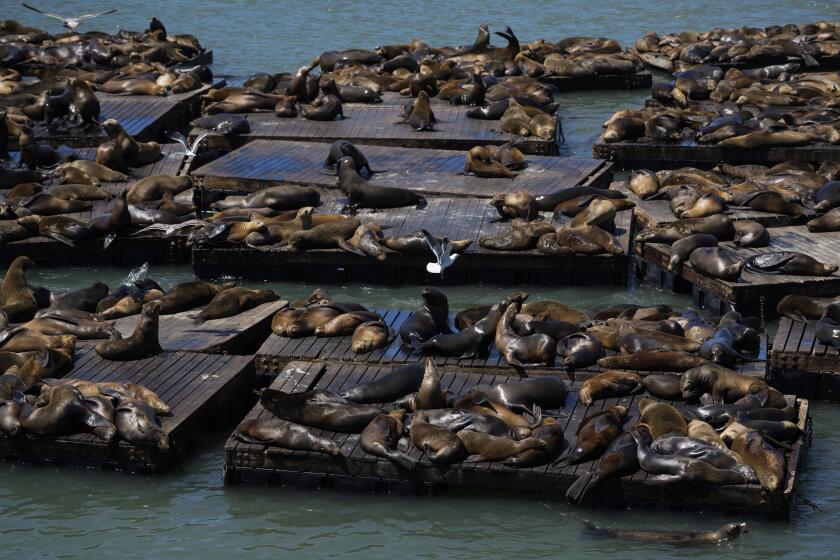For Thousands of Elderly, a Social Security Surprise
In the living room of their Thousand Oaks apartment, George N. Thompson dejectedly slumped into an easy chair, observing paramedics cut off the blouse of his wife, Luella, whose heart had stopped, and begin cardiopulmonary resuscitation as she lay on the carpet.
“I thought to myself: ‘Let her go, fellas,’ ” he recalled.
It was September, 1985. The 71-year-old woman had undergone five open-heart operations, and now she had suffered a stroke while watching television.
On the morning of Oct. 29, as Luella Thompson lay in a hospital bed, her husband noticed something: “She had a habit of puckering her lips for a kiss,” he recalled. “She was awake, and was doing that, so I went over, kissed her, and she closed her eyes.” That afternoon, she died.
Reminded of Painful Days
Now, more than two years later, the 70-year-old Thompson is being reminded of those painful days in what he considers a most unsettling way. As in the cases of tens of thousands of Californians--most of them elderly--the federal government has come around to reclaim Social Security benefits paid to the Thompsons’ joint account before his wife died.
To many of these survivors, the notices are irritatingly late--months and even years after their loved ones died--and they have reacted with outrage to the financial institutions that are required by the government to bear the bad news. To those living from month to month on Social Security themselves, repayment can be difficult.
But the reason for the delay, federal and financial officials say, actually was another survivor--a widow who took the U.S. government to court and, for a while, was winning.
Her case halted reclamation notices in California for up to 2 1/2 years, and now that it has been resolved in court, banks and savings and loans are working to clear up the backlog.
Early in April, Thompson, a retired Episcopal priest, went to the mailbox of his apartment complex, opened an envelope and found this notice from California Federal Savings & Loan, where he maintains an account:
“The Department of the Treasury has notified our institution of a change in reclaiming government overpayments made by direct deposit into decedent joint accounts. The Treasury has required California Federal to recover these overpayments in accordance with existing Federal regulations for reclamation processing.”
The notice went on to say that, because Thompson didn’t have enough money in the account, he was being asked to forward a payment of $200. That amount represented his late wife’s Social Security spousal benefit for the month in which she died.
Under the Social Security Act, a benefits recipient must live through an entire month to be eligible to collect the check that arrives near the beginning of the next month. Otherwise, the check must be returned in its entirety by the recipient’s survivors. There is no pro-rating.
“So if you are a recipient and die at 11:59 p.m. on the 31st day of a month, you weren’t eligible for the check that arrives a few days later,” Phil Gambino, deputy press officer at Social Security Administration headquarters in Baltimore, said in an phone interview.
Because 2 1/2 years had passed since the death of his wife, Thompson shot back in letter to the savings institution: “Why doesn’t California Federal Savings and the U.S. Treasury allow Luella to remain dead!”
What he didn’t know was that he was far from alone. For the past nine months, similar notices have been sent out by savings institutions throughout California to survivors in similar circumstances--all of them the result of the resolution of a federal court case in Northern California.
“Since September of last year, we have sent out an average of 300 notices of reclamation per month, or about 2,500 to date,” said John Kaufman, spokesman for CalFed Inc., parent company of California Federal Savings & Loan.
Death Enters the Picture
Some of the reclamations, he said, involve as many as six overpayments of at least $200 each. “Some of the customers have died or have moved, and we are trying to locate them,” Kaufman said. “We expect to lose $20,000 as a result.”
Kaufman said CalFed expects to reimburse the U.S. Treasury $1.5 million and that the process should be over by the end of June.
When a savings institution signs up with the Treasury Department to participate in Social Security’s Direct Deposit program (in which benefits for Thompson and about half of all recipients are deposited in bank accounts electronically), “the institution is, in effect, taking responsibility for all the money,” Gambino explained. “It usually gets one massive deposit from the Treasury Department and puts the money into individual accounts.”
Because many Social Security recipients are elderly, death eventually enters the picture. “People are basically honest,” Gambino said. “More than 99% of the time, we get voluntary reports of deaths from relatives.”
Indeed, such was the case with Thompson, who said he notified the Social Security office in Thousand Oaks as soon as he received his wife’s death certificate. But at the time, the federal government had its hands tied by a court case filed the year before.
The plaintiff was a widow named Berdie Thomas of Northern California, who filed suit against the U.S. Department of Health and Human Services. “Her husband had died, and some government money had gone into their joint account in California,” Gambino said. “The Treasury Department, as usual, told the bank of its obligation to see that the money was returned.”
But Thomas filed suit, charging that the government should have allowed the bank to inform her before they took the money out of the account.
The issue had come up in 1983, during a hearing by the U.S. Senate Special Committee on Aging. Sen. John Heinz (R-Pa.) said at the time that failure to give a family any notice prior to Direct Deposit fund recoveries in death cases was “outrageous” and amounted to “Big Brother debt collection tactics.”
In December, 1984, Thomas won an injunction in federal court in San Francisco. It barred the Treasury Department and savings institutions from recovering funds erroneously distributed as the result of the death of the recipient. The ruling applied only to California, and the recovery process continued in other states.
Recoveries Halted
Thus, Social Security recoveries were halted in California while the case was being decided. But in June, 1986, the 9th U.S. Circuit Court of Appeals in San Francisco ruled in favor of the federal government, and it reaffirmed the decision last spring.
“In effect, it upheld the process of reclaiming the Social Security monies erroneously distributed to joint accounts involving a deceased person,” Gambino said. “We then instructed the Treasury Department to begin notifying savings institutions that they should resume what they had been doing before the interruption.”
Survivors like Thompson, then, are merely feeling the effects of a 2 1/2-year delay. But Gambino offered this advice on lessening the impact of the regulation in the future:
- Notify the Social Security Administration of a death, but also notify the deceased’s savings institution.
- When notifying Social Security, tell whether a direct deposit into a joint account had been involved. The survivor can make an immediate refund, clearing up the account immediately.
- Don’t close out accounts of a deceased person until any government money is refunded. If the accounts are closed, a relative may later have to pay what is due out of his or her own pocket.
That’s just what happened to Thompson. “The notice I received from my savings and loan requested $200 because--and they were right--my account had insufficient funds,” he said while seated in his apartment living room, its walls covered with paintings done by his late wife.
“It was near the first of the month, and I had just $3 or $4 in the account. I am a senior living on the edge of survival. I get about $400 a month in Social Security, $90 monthly from my pension as an Episcopal priest, and about $120 weekly from a part-time mail clerk job.”
One of the reasons he took the part-time job, he said, was to complete payments he is making toward the $465 required to put a grave marker atop his wife’s cremated remains in a cemetery in Altoona, Pa.
Kaufman, the California Federal spokesman, said his company recognizes the difficult position in which Thompson finds himself.
“We are treating Mr. Thompson in the same manner as we would treat any other person in this reclamation process,” Kaufman said. “In other words, we have arranged special payback terms, without any interest due, extending his payment term.”
More to Read
Start your day right
Sign up for Essential California for news, features and recommendations from the L.A. Times and beyond in your inbox six days a week.
You may occasionally receive promotional content from the Los Angeles Times.






